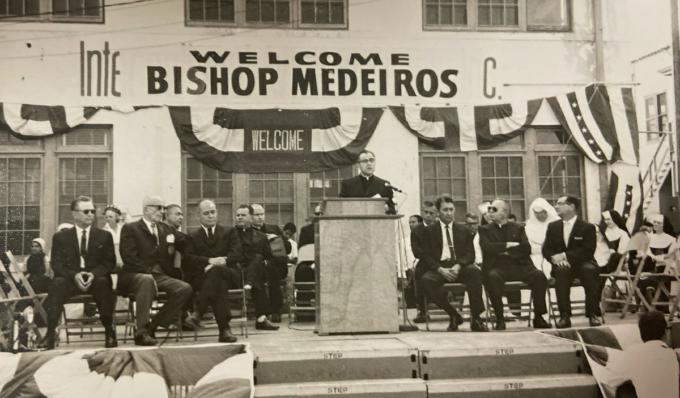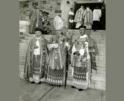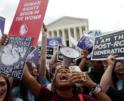
Culture
Humberto Medeiros' greatest legacy as bishop of Brownsville was certainly his advocacy for migrant farm workers. His immigrant background and knowledge of Spanish made him the perfect spokesman for this community in their battle with growers for adequate wages.
Humberto Medeiros was not only surprised when he was named bishop in Brownsville; in fact, he had to find on a map where the Holy Father had sent him! Still, commenting on Medeiros' appointment, the dean of American Catholic historians, and a former teacher of Medeiros at Catholic University, John Tracy Ellis, spoke of his appointment as "a striking example of the right man in the right place." On the southeastern border of Texas with Mexico, Brownsville had only become a diocese in 1965, separating from Corpus Christi. For all practical purposes, Medeiros was the first bishop as Adolph Marx, who took the reins as bishop in September 1965, resided in the diocese for only a couple of weeks before traveling to Rome for the fourth session of Vatican II. He died on November 1 while on a home visit to Germany. For this reason, and others, Medeiros faced some significant challenges when he arrived to serve the newly created diocese.
Upon his arrival and installation on June 29, 1966, Medeiros' immediate challenge was to address parochial issues. Brownsville had the lowest ratio of priests to Catholics in the nation. When he arrived, there were 82 priests in the diocese but only 16 were local diocesan clergy. There were 38 parishes and 59 missions. An initial visitation of the diocese revealed that parishes and the priests who served them were divided by ethnicity; religious primarily served the Hispanic poor and the diocesan clergy serviced the middle to upper-class Western European peoples. He immediately took action to remove this perception of segregation, making every effort to assure that all people were welcomed at all parishes.
Medeiros organized the diocese and, based on a census taken shortly after his arrival, made plans for programs to assist the faithful. One initial challenge was to settle the division of assets and other financial matters that arose from the separation of Brownsville from Corpus Christi. Believing in the precepts of Vatican II, he inaugurated the Visitors for Christ Program, a parish-based, lay-driven plan for re-evangelization of the faithful. The plan was very successful, leading to greater participation by local Catholics in their parishes. Realizing the need for financial support, he instituted a diocesan-wide fiscal stewardship program. Understanding the need for good communication within the diocese, he started a diocesan paper, the Valley Catholic Witness. During his tenure, he established 18 new parishes and several missions. He was a proud advocate for Catholic education, maintaining schools that teetered on financial collapse, and formalized the Confraternity for Christian Doctrine (CCD) program, greatly expanding its enrollment.
Humberto Medeiros' greatest legacy as bishop of Brownsville was certainly his advocacy for migrant farm workers. His immigrant background and knowledge of Spanish made him the perfect spokesman for this community in their battle with growers for adequate wages. Medeiros' campaign began immediately upon his arrival in the diocese as he found himself embroiled in a local strike, which pitted workers against growers. He firmly believed that any resolution required justice for both parties -- workers and growers. He became a strong advocate, and eventually saw the implementation of a legislated minimum wage of $1.25 per hour. In support of workers, Medeiros participated in two "follow the crop" tours in the summers of 1969 and 1970. Following the migrant workers through several Midwest states, Medeiros manifested his support in spiritual and temporal ways.
Medeiros was also active on a national front with farmworkers. In November 1969, he was appointed to a special Ad Hoc Committee on Farm Labor of the NCCB. Over the next eight months, Medeiros and other committee members brokered an agreement between the United Farmworkers of California (UFWOC), led by Cesar Chavez, and numerous growers, in the Imperial and San Joaquin valleys. The agreement, while criticized by some, was heralded by most as a significant breakthrough, bringing justice to both sides of a long-protracted table-grape strike.
Besides the Ad Hoc committee, Medeiros also served the Latin American Bureau of the NCCB, which worked primarily with dioceses in South America, assisting them financially. As chairman of the allocation subcommittee, Medeiros made decisions on the use of funds for various projects. Additionally, he traveled to Latin America with other American bishops, seeking to bring greater unity to the Church's efforts throughout the Western Hemisphere.
In September 1970, shortly after returning from his second migrant tour, Medeiros received word of his appointment as the Archbishop of Boston. Celebrating Medeiros' contribution, Newsweek, in its September 21, 1970, issue provided a fitting tribute to his years in Texas: "In his four years as Bishop of Brownsville, Texas, a small, dirt-poor diocese in the Rio Grande Valley, Medeiros has proved a real father to Mexican-Americans."
FATHER RICHARD E. GRIBBLE, CSC, IS A MEMBER OF THE FACULTY OF STONEHILL COLLEGE IN NORTH EASTON, AND AUTHOR OF A FORTHCOMING BIOGRAPHY OF CARDINAL MEDEIROS.
Recent articles in the Culture & Events section
-
What is truth?Michael Reardon
-
The 75th anniversary of St. Ignatius of Loyola Church, Chestnut HillThomas Lester
-
The most important prayer you already knowLaura Kelly Fanucci
-
Two years after DobbsRussell Shaw
-
Scripture Reflection for July 21, 2024, Sixteenth Sunday in Ordinary TimeDeacon Greg Kandra


















